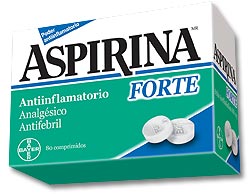Divided CAFC Panel Affirms TTAB: "ASPIRINA" Merely Descriptive of Analgesics
In a precedential ruling, a divided panel of the US Court of Appeals for the Federal Circuit upheld the TTAB's December 1, 2005 decision [TTABlogged here], affirming a mere descriptiveness refusal of the mark ASPIRINA for analgesics. The panel majority found that, despite recognized conflicts in the evidentiary record, the Board's decision was supported by substantial evidence. In re Bayer Aktiengesellschaft, 82 USPQ2d 1828 (Fed. Cir. 2007) [precedential].

The Examining Attorney relied on numerous NEXIS excerpts and two dictionary definitions in which ASPIRINA was defined as aspirin. Bayer submitted its own dictionary evidence referring to ASPIRINA as a trademark, attacked the PTO evidence, and pointed to its numerous foreign trademark registrations for ASPIRINA [which the CAFC panel majority found to be irrelevant]. The Board concluded that consumers will view ASPIRINA as a mere variation or misspelling of the generic term "aspirin" that immediately conveys the impression that Bayer's goods are aspirin-based.
The CAFC found that, as the TTAB observed, there was conflicting evidence as to the mere descriptiveness of ASPIRINA as a variation or misspelling of aspirin. However, the court's standard of review is not de novo, but rather "the deferential substantial evidence standard."
"Where two different conclusions may be warranted based on the evidence of record, the Board's decision to favor one conclusion over the other is the type of decision that must be sustained by substantial evidence."
The CAFC therefore affirmed the Board's decision.
In dissent, Judge Newman asserted that "the evidence and the great weight of usage show ASPIRINA as a trademark." She viewed ASPIRINA as a well-known mark which Americans may know from foreign markets, a factor that should not be ignored in assessing registrability in the United States.
"To deny the statutory federal registration, there must be clear and convincing evidence of the invalidity of that property right and a sound public interest served by its forfeiture."
According to Judge Newman, the panel majority's ruling means that, because aspirin is generic, so is ASPIRINA. But the genericness issue was not before the Board, and Bayer did not have a hearing on that issue, in violation of its due process right.
TTABlog comment: With regard to the TTAB's decision, I asked whether, in view of the conflicting evidence, Bayer should have gotten the benefit of the doubt. The same question comes to mind after reading the CAFC's decision.
Okay, so now what happens when Bayer seeks registration under Section 2(f)? How much evidence will be required? Just how descriptive is ASPIRINA? I have a feeling that this mark will be registered under Section 2(f).
Text Copyright John L. Welch 2007.




0 Comments:
Post a Comment
<< Home